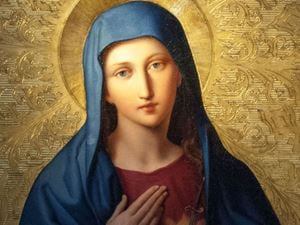
Mary, the mother of Jesus, was an incredible woman. In fact, few women’s names could have been mentioned to give her a “run for her money.” The Lord favored her for an event that had been long awaited since the Genesis 3:15 prophecy of the Seed of a woman (i.e., the Virgin Birth). The Bible tells us, “Mary the mother of Jesus was described by God as ‘highly favored’" (Luke 1:28). The phrase highly favored comes from a single Greek word, which essentially means “much grace.” Mary received God’s grace.
Grace as it relates to the Bible is “unmerited favor”; that is, grace is a blessing we receive despite the fact that we do not deserve it. Mary needed grace from God just as the rest of us do. Mary herself understood this fact, as she declared in Luke 1:47, “My spirit rejoices in God my Savior.”
Mary recognized, through God’s grace, that she needed a Savior. The Bible never says that Mary was anyone but an ordinary human whom God chose to use in an extraordinary way. Yes, Mary was a righteous woman and favored by God (Luke 1:27-28). At the same time, Mary was human – she was a sinful human being who needed Jesus Christ as her Savior, just like everyone else. The Bible reminds us, “Surely there is not a righteous man on earth who does good and never sins” (Ecclesiastes 7:20). The Bible also says, “For all have sinned and fall short of the glory of God” (Romans 3:23).
The Bible doesn’t suggest Mary’s birth was anything but a normal human birth. The Bible does tells us that Mary was a virgin when she gave birth to Jesus. Scripture says, “And Mary said to the angels, ‘How will this be, since I am a virgin?’ And the angel answered her, ‘The Holy Spirit will come upon you, and the power of the Most High will overshadow you; therefore the child to be born will be called holy – the Son of God…” (Luke 1:34-28). This was a fulfillment of a prophecy from Isaiah, “Therefore the Lord Himself will give you a sign. Behold, the virgin shall conceive and bear a Son, and shall call His name Immanuel” (Isaiah 7:14). However, Mary’s virginity after the birth of Christ can become a heated debate in some circles. While many will argue that Mary remained a virgin for the duration of her life, this isn’t what the Bible says. Mary was not a virgin permanently. The idea of perpetual virginity of Mary is unbiblical.
Matthew 1:25, in speaking of Joseph, declares, “But he had no union with her until she gave birth to a son. And he gave Him the name Jesus.” The word until clearly indicates that Joseph and Mary did have a normal sexual relations after Jesus was born. The perpetual virginity of Mary was challenged by Matthews’s Gospel, which says that Joseph, “did not have sexual relations with her until her son was born” (Matthew 1:25). The sinlessness of Mary can’t be found in the Bible and is more so a matter of Church tradition.
Mary remained a virgin until the Savior’s birth, but later Joseph and Mary had several children together. Jesus had four half-brothers: James, Joseph, Simon and Judas. The Bible tells us this in Matthew 13:55, “Is not this the carpenter’s son? Is not His mother called Mary? And are not his brothers James and Joseph and Simon and Judas?” Jesus also had half-sisters, although they are not named or numbered (Matthew 13:55-56). God blessed and graced Mary by giving her several children, which in that culture was accepted as the clearest indication of God blessing a woman.
Mary’s life was foreshadowed in the Old Testament and the events of her life are recorded in the New Testament. The prophecy of Isaiah 7:14 speaks of the “Virgin-Mother of Emmanuel”: “Therefore, the Lord himself will give you a sign. Behold, a virgin shall conceive and bear a son, and His name shall be called Emmanuel.” Later in Isaiah, Emmanuel is referred to as the future Savior of His people. The prophet foretells an extraordinary future sign: that a virgin, without the cooperation of a man, would give birth to a child who will be “God with us”. This child would remedy the great trials of division facing the people of Israel. Isaiah’s prophecy predicts the Virgin of Nazareth and the birth of Jesus.
Mary loved God and wanted to serve Him with all her heart. But she was just a poor girl in an insignificant town, from a humble family, with little expectations that her life going to be any different than most. When the angel Gabriel came to Mary to tell her she was chosen and favored by God to be the mother of His son, despite her own fear, she exhibited great courage and character: “I am the Lord’s servant…May your word to me be fulfilled” (Luke 1:38). She also exhibited great courage and character during Jesus’ earthly life and ministry. She pressed Jesus to provide wine when it ran low at the wedding in Cana, she approached Jesus when He was left behind at the temple, she went from Nazareth to Capernaum when she learned what was being reported their about Jesus, and she attempts to protect Jesus in some of the stickiest of situations. She was a person of discipleship and faith, and the first true follower of Jesus. Mary is considered by many to be the greatest of all saints because she was chosen and prepared by God to be the mother of His Son, and because she freely chose to cooperate fully in the graces given to her and in the vocation she received. In Mary’s Song of Praise (The Magnificat), she says, “My soul magnifies the Lord, and my spirit rejoices in God my Savior, for He has looked on the humble estate of His servant. For behold, from now on all generations will call me blessed; for He who is mighty had done great things for me, and holy is His name” (Luke 1:46-49).
Mary, the mother of Jesus, is one of the most admired figures in Scripture and considered by many to be the greatest of all Christian saints. She was a willing servant who trusted God and obeyed His call. While her life held great honor, her calling also required great suffering. Though there was joy in motherhood, there was great pain in the privilege of being the mother of the Messiah. Despite these things, she responded to God with great obedience and submission to His plan. Her life never robbed Jesus of His glory, for her mission was to witness the glory of the Son of God.

